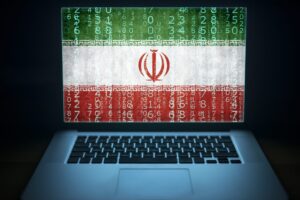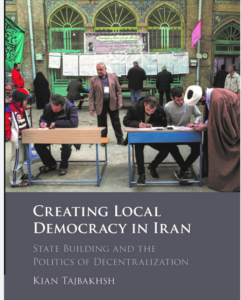Volatility is likely to characterize the process by which Iran’s supreme leader Ali Khamenei’s successor is chosen. It will be rather chaotic, with many spoilers and few sincere brokers, argues Ali Reza Eshragi, Director of Programs at the Institute for War and Peace Reporting and a Visiting Scholar at the University of North Carolina at Chapel Hill.
Elites who have been spurned by the current political order will move to capitalize on Iran’s greatest power vacuum since 1989. That Iran is fertile ground for popular unrest only adds to the uncertainty, he writes for Foreign Affairs:
Indeed, the only thing that is clear is that Iran’s contemporary elite is not prepared for this moment. It is rarely prepared for any turmoil—as the slow, halting, and then very violent response to the protests made readily apparent. Instead, when faced with crisis, the Iranian elite simply improvises and muddles along. Its struggles will not end when the succession process is over: the next leader of Iran is likely to be just as mercurial as the last.
Iran’s Coming Succession Crisis https://t.co/mJy1gh3py5 via @ForeignAffairs
— Democracy Digest (@demdigest) May 24, 2023
The Islamic Republic has been steadily improving and sharpening its cyber warfare, cyber espionage, and electronic sabotage abilities, staging complex operations that, while not always successful, show what experts in the field describe as devious inventiveness, notes Borzou Daragahi, a nonresident fellow with the Atlantic Council’s Middle East Security Initiative:
Iran’s cyber efforts have been steadily broadening. They range from attempting to hack into defense, civil society, and private systems abroad to harassment campaigns against opponents in the diaspora. …In early May, Microsoft issued a warning about Iran’s increasingly aggressive and sophisticated tactics.
 “Iranian cyber actors have been at the forefront of cyber-enabled influence operations, in which they combine offensive cyber operations with multi-pronged influence operations to fuel geopolitical change in alignment with the regime’s objectives,” said the report by Microsoft’s Clint Watts, a former FBI cybersecurity expert.
“Iranian cyber actors have been at the forefront of cyber-enabled influence operations, in which they combine offensive cyber operations with multi-pronged influence operations to fuel geopolitical change in alignment with the regime’s objectives,” said the report by Microsoft’s Clint Watts, a former FBI cybersecurity expert.
Iranian President Ebrahim Raisi has appointed Ali Akbar Ahmadian, a commander of the Islamic Revolutionary Guards Corps (IRGC), as the new secretary of the Supreme National Security Council (SNSC). Ahmadian replaces Rear Admiral Ali Shamkhani, an ethnic Arab who had served as secretary of the key policy-shaping body since 2013 and recently signed a China-brokered agreement aimed at mending ties with Saudi Arabia, RFE/RL’s Golnaz Esfandiari reports.
 He was appointed to the SNSC by former relative moderate President Hassan Rohani. According to conservative political activist Mansoor Haghighatour, the hard-line Raisi had sought to replace Shamkhani since taking over as president in 2021, but had not been able to find a suitable replacement.
He was appointed to the SNSC by former relative moderate President Hassan Rohani. According to conservative political activist Mansoor Haghighatour, the hard-line Raisi had sought to replace Shamkhani since taking over as president in 2021, but had not been able to find a suitable replacement.
“I don’t think there will be a change in domestic policies, state repression, and foreign and regional policies,” Paris-based analyst Reza Alijani told RFE/Rl’s Radio Farda.
An Iranian diplomat has been appointed to chair the UN Human Rights Council (UNHRC) Social Forum in November 2023, Deutsche Welle reports. UNHRC President Vaclav Balek announced the appointment of the Iranian foreign policy expert in a letter dated May 10, 2023. Ali Bahreini, Ambassador and Permanent Representative of the Islamic Republic of Iran to the United Nations, was chosen from among several regional candidates.
 “The appointment of an Iranian official to chair a UNHRC forum while the council investigates the deaths of hundreds of peaceful protesters in Iran reflects a shocking ethical blindness,” said Hadi Ghaemi, head of the New York-based Center for Human Rights in Iran (CHRI).
“The appointment of an Iranian official to chair a UNHRC forum while the council investigates the deaths of hundreds of peaceful protesters in Iran reflects a shocking ethical blindness,” said Hadi Ghaemi, head of the New York-based Center for Human Rights in Iran (CHRI).
The UN and Member States must not let the Islamic Republic of Iran make a mockery of the UN Social Forum and undermine the credibility of the institution, said the Abdorrahman Boroumand Center for Human Rights in Iran. States must now make up for this failure. They must not let the Islamic Republic of Iran take control of the UN Social Forum and receive the undue honors associated with the function of Chair-Rapporteur.
 Kian Tajbakhsh’s most recent book, “Creating Local Democracy in Iran: State Building and the Politics of Decentralization,” explores how ideologically opposed actors shaped local government as an integral component of authoritarian state building, the Stanford Iranian Studies Program notes (above). Tajbakhsh, a Senior Advisor at Columbia Global, was previously the Open Society (Soros) Foundation’s representative in Iran in the 2000s, where he directed several initiatives aimed at strengthening civil society. He was among the pro-democracy activists arrested and detained by the Iranian government during the Green Movement protests in 2009 and released as part of the 2016 Iran/P5+1 Nuclear Deal.
Kian Tajbakhsh’s most recent book, “Creating Local Democracy in Iran: State Building and the Politics of Decentralization,” explores how ideologically opposed actors shaped local government as an integral component of authoritarian state building, the Stanford Iranian Studies Program notes (above). Tajbakhsh, a Senior Advisor at Columbia Global, was previously the Open Society (Soros) Foundation’s representative in Iran in the 2000s, where he directed several initiatives aimed at strengthening civil society. He was among the pro-democracy activists arrested and detained by the Iranian government during the Green Movement protests in 2009 and released as part of the 2016 Iran/P5+1 Nuclear Deal.







